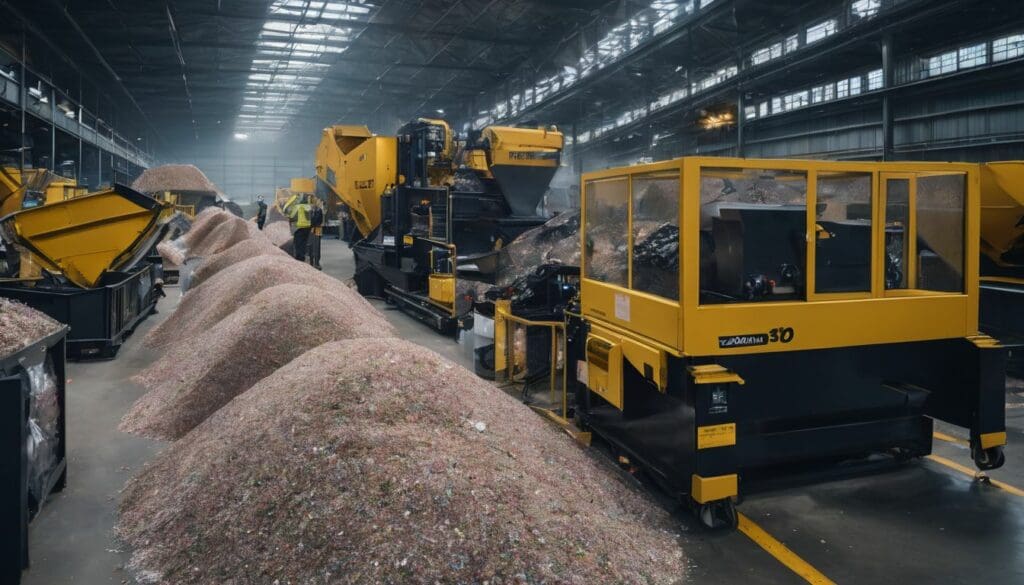In an era where the thirst for resources is escalating at an unprecedented rate, our planet’s reserves are being stretched thin. With a background deeply rooted in environmental science and technology, I’ve witnessed how this relentless demand strains both ecosystems and energy supplies, leading to detrimental effects on our environment.
Artificial intelligence (AI) offers a beacon of hope; its capacity to revolutionise sustainability is not just promising but pivotal in steering us towards a greener horizon.
Harnessing the power of AI unlocks astonishing potential in resource management and waste reduction. This advanced technology is already making waves by enabling smarter energy use that curtails unnecessary consumption – thereby slashing costs and carbon footprints alike.
The insights provided here will shed light on innovative ways AI contributes to our battle against waste, highlighting sustainable strategies that had been previously unattainable.
Prepare to uncover a realm where cutting-edge AI meets eco-consciousness, transforming how we view sustainability forever. Keep reading; the future is smarter than you think!
Key Takeaways
- Artificial Intelligence helps manage the planet’s resources more sustainably by optimising energy consumption and predicting waste patterns to reduce excess.
- Through advanced data analysis and predictive modelling, AI enhances efficiency in waste sorting and recycling efforts, leading to better resource recovery and less environmental impact.
- Successful implementations of AI in sectors like energy management demonstrate tangible benefits such as improved operational efficiency, cost savings, safety, and regulatory compliance.
- The integration of AI into sustainable practices supports global efforts to combat climate change by reducing carbon emissions from excessive or needless resource use.
- As technology progresses, AI’s role in sustainability is poised for significant growth with the potential to revolutionise how we address environmental challenges.
The Growing Challenge of Energy and Resource Management
Increased global demand for resources and energy has put a strain on the environment, leading to issues such as depletion of natural resources and increased carbon emissions. This growing challenge calls for innovative solutions to optimise resource usage and reduce waste.
Increased global demand for resources
Populations are booming, and economies are growing. This pushes the global demand for resources to unprecedented levels. Resources like water, minerals, timber, and energy are being consumed faster than ever before.
As this consumption rises, it creates a massive strain on our planet.
Artificial intelligence (AI) offers us powerful tools to manage this surge in resource use more sustainably. AI technologies can analyse complex data to optimise energy consumption and reduce waste at every step of production.
They help design processes that save raw materials and monitor environmental impacts closely. Intelligent systems can foresee resource needs and adjust supply chains accordingly, preventing overuse before it happens.
With AI’s assistance, we’re not just reacting to the demand; we’re planning for it intelligently while preserving our environment for future generations.
The impact on the environment
AI’s impact on the environment is substantial, as it enables optimised resource management and waste reduction. By analysing data on waste production, collection, and disposal, AI helps improve waste management practices.
This leads to enhanced resource recovery and minimised waste generation. Moreover, through the optimisation of energy consumption, AI actively reduces carbon emissions—playing a crucial role in combating climate change and promoting environmental conservation.
Artificial intelligence also supports sustainability efforts by monitoring and reducing environmental impacts while aiding in pollution control. With its potential to significantly contribute to climate change mitigation, AI is at the forefront of promoting ecological balance.
How Artificial Intelligence Can Help
Artificial Intelligence can help in sustainable resource management by analysing data to optimise energy usage, predicting and reducing waste, as well as improving waste sorting and recycling processes.
AI’s capabilities make it an essential tool for addressing the growing challenge of energy and resource management.
Optimising energy usage through data analysis
Data analysis through AI is optimising energy consumption, reducing carbon emissions, and contributing to combating climate change. By analysing patterns and trends in energy usage, AI systems can identify areas for improvement, leading to more efficient use of resources.
This helps in reducing the ecological footprint and promoting sustainable development by enhancing the utilisation of renewable energy sources. Additionally, AI tools effectively monitor and reduce environmental impacts, enabling smart cities to adopt green technology for a more sustainable future.
AI-driven data analysis optimises resource utilisation by identifying opportunities for improved efficiency and cost savings. It facilitates the integration of renewable energy into existing systems, supporting environmentally friendly practices while ensuring compliance with safety regulations.
Reducing waste through predictive modelling
AI plays a crucial role in reducing waste through predictive modelling. By analysing data on waste production, collection, and disposal, AI can anticipate patterns and trends to optimise resource utilisation and minimise waste.
Machine learning algorithms enable businesses to predict potential areas of excess waste, allowing for proactive measures to be taken in preventing unnecessary garbage generation.
Furthermore, AI-powered waste management systems contribute to sustainable solutions for waste valorisation, enhancing resource recovery while minimising environmental impact. This approach not only streamlines waste management operations but also supports conservation efforts by identifying opportunities for reducing overall waste output.
Enhanced waste sorting and recycling
AI plays a crucial role in enhancing waste sorting and recycling processes, contributing to sustainable resource management. By analysing data on waste production, collection, and disposal, AI optimises waste sorting operations and facilitates efficient recycling practices.
This technology enables the development of innovative solutions for waste valorisation, promoting resource recovery while minimising environmental impact. Additionally, AI-driven predictive modelling enhances the accuracy of recycling initiatives by identifying optimal materials for reprocessing, further supporting conservation efforts.
Furthermore, AI technologies support the implementation of advanced waste sorting systems that can efficiently segregate different types of recyclables from mixed waste streams. These systems enable increased automation in recycling facilities and aid in streamlining the overall recycling process.
The Benefits of AI in Sustainable Resource Management
AI offers improved efficiency and cost savings in sustainable resource management. It also contributes to increased safety and compliance, making it an invaluable tool for building a more sustainable future.
Improved efficiency and cost savings
AI optimises resource management, leading to substantial efficiency improvements and cost savings. By analysing data on waste production, collection, and disposal, AI streamlines waste management operations, reducing human error and optimising resource utilisation.
This not only minimises waste but also enhances the recovery of valuable resources, contributing to significant cost reductions for businesses. Additionally, by optimising energy consumption through data analysis and predictive modelling, AI reduces carbon emissions and overall energy costs.
These benefits make AI an indispensable tool in achieving sustainable resource management while realising significant economic gains.
Increased safety and compliance
AI plays a crucial role in ensuring increased safety and compliance in sustainable resource management. By analysing data on waste production, collection, and disposal, AI enhances waste sorting and recycling processes.
This optimises resource recovery while minimising waste, contributing to environmental conservation efforts. AI-powered systems also streamline waste management operations, reducing human error and optimising resource utilisation for more efficient and compliant processes.
In fashion sustainability, AI’s size optimisation reduces waste production while enhancing fit. Additionally, by monitoring energy consumption and aiding in pollution control, AI actively supports climate change mitigation and environmental sustainability efforts worldwide.
Implementing AI for Sustainable Resource Management
Successful implementation examples and key advantages of using AI in sustainable resource management will be explored in this section, highlighting the potential for future growth and development in this area.
Examples of successful implementation
Artificial intelligence (AI) has been successfully implemented in various sustainability initiatives, making a tangible impact on resource management and waste reduction. Here are some notable examples:
- In the energy sector, AI – powered systems have optimised energy consumption by analysing patterns and adjusting usage for maximum efficiency.
- AI technologies have been used to enhance waste sorting and recycling processes, leading to improved resource recovery and reduced landfill waste.
- AI – driven predictive modelling has enabled businesses to anticipate demand patterns and minimise overproduction, thereby reducing unnecessary waste.
- AI applications in fashion sustainability have facilitated size optimisation, resulting in reduced fabric wastage and a more sustainable production process.
- Waste valorisation initiatives supported by AI algorithms have led to enhanced resource recovery and minimised environmental impact.
Key advantages of using AI
Implementing AI for sustainable resource management offers numerous key advantages. AI technology optimises resource utilisation, reduces waste, and enhances energy efficiency. It enables data-driven decision-making, leading to improved operational efficiency and cost savings.
Additionally, AI-powered systems enhance safety and compliance in waste management processes. Furthermore, by harnessing predictive modelling and data analysis capabilities, AI contributes to the development of sustainable solutions for waste valorisation and resource recovery while minimising environmental impact.
Potential for future growth and development
AI’s potential for future growth and development in sustainable resource management is vast. As technology advances, AI can further enhance waste sorting and recycling processes, leading to even greater efficiency in resource recovery and waste minimisation.
Moreover, continual research and innovation in AI applications are paving the way for more comprehensive solutions to address environmental challenges such as climate change and pollution control.
Researchers and businesses are exploring new frontiers of AI’s role in sustainability problems, opening doors for novel approaches to environmental impact monitoring and reduction.
Conclusion: The Role of AI in Building a Sustainable Future
Artificial Intelligence plays a crucial role in promoting sustainability. It optimises resource management and reduces waste through data analysis. Implementing AI in sustainable practices sets the stage for a greener future.
The potential for growth and development promises even more effective resource utilisation. Embracing AI is vital for building a sustainable environment that conserves resources and minimises waste.
FAQs
1. What is Artificial Intelligence for sustainability?
Artificial Intelligence for sustainability refers to using AI technology to make better use of resources, which helps cut down waste and supports a greener planet.
2. How can AI reduce waste in daily operations?
AI analyses tonnes of data to find patterns that let businesses predict demand more accurately, resulting in less overproduction and minimised waste.
3. Does optimising resources with AI really make a big difference?
Absolutely! By optimising resources efficiently, AI not only saves cost but also ensures we use our planet’s precious materials wisely without unnecessary depletion.
4. Can artificial intelligence improve recycling processes?
Yes, artificial intelligence systems can sort recyclables from waste quicker and more precisely than humans, boosting the amount we can recycle.





